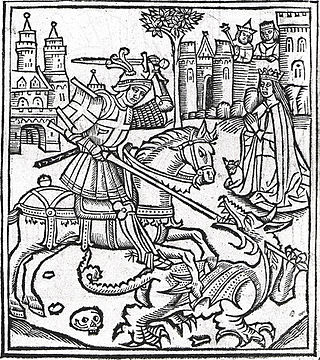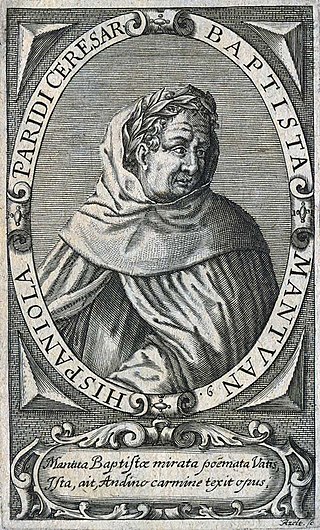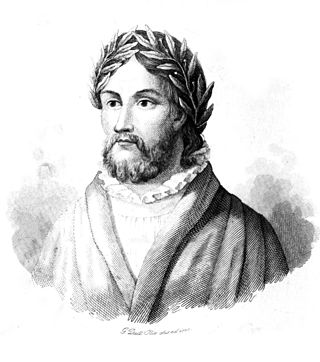Related Research Articles

Year 1518 (MDXVIII) was a common year starting on Friday of the Julian calendar. Within much of Christian Europe, New Year's Day was celebrated on January 1, the rule in the Roman Empire since 45 BC, and in 1518, the year ran from January 1, 1518 to December 31, 1518. In England and Scandinavia, the year ran from the Feast of the Annunciation to March 24, 1519; and in France from Easter Sunday to April 23, 1519. For instance, the will of Leonardo da Vinci, drafted in Amboise on 23 April 1519, shows the legend "Given on the 23rd of April 1518, before Easter".* See Wikisource "1911 Encyclopædia Britannica/Easter".

Dr Alexander Barclay was a poet and clergyman of the Church of England, probably born in Scotland.
This article contains information about the literary events and publications of 1585.
This article contains information about the literary events and publications of 1516.
This article contains information about the literary events and publications of 1515.
This article contains information about the literary events and publications of 1507.
This article contains information about the literary events and publications of 1506.

Renaissance literature refers to European literature which was influenced by the intellectual and cultural tendencies associated with the Renaissance. The literature of the Renaissance was written within the general movement of the Renaissance, which arose in 14th-century Italy and continued until the mid-17th century in England while being diffused into the rest of the western world. It is characterized by the adoption of a humanist philosophy and the recovery of the classical Antiquity. It benefited from the spread of printing in the latter part of the 15th century.
Nationality words link to articles with information on the nation's poetry or literature.

Baptista Spagnuoli Mantuanus, O.Carm was an Italian Carmelite reformer, humanist, and poet.

Dirk Martens was a printer and editor in the County of Flanders. He published over fifty books by Erasmus and the very first edition of Thomas More's Utopia. He was the first to print Greek and Hebrew characters in the Netherlands. In 1856 a statue of Martens was erected on the main square of the town of his birth, Aalst.

Conrad Lycosthenes, born Conrad Wolffhart, was an Alsatian humanist and encyclopedist. Deacon of Saint Leonard in Basel, professor of grammar and dialectics, Lycosthenes had a passion for the study of nature and geophysics.

Publio Fausto Andrelini was an Italian humanist poet, an intimate friend of Erasmus in the 1490s, who spread the New Learning in France. He taught at the University of Paris as "professor of humanity" from 1489, and became a court poet in the circle around Anne of Brittany, the queen to two kings.
Hermann von dem Busche was a German humanist writer, known for his Vallum humanitatis (1518). He was a pupil of Rudolph von Langen. Vallum humanitatis, sive Humaniorum litterarum contra obrectatores vindiciae (1518) was in effect a manifesto for the humanist movement of the time.
Nationality words link to articles with information on the nation's poetry or literature.
Nationality words link to articles with information on the nation's poetry or literature.
Nationality words link to articles with information on the nation's poetry or literature.
Nationality words link to articles with information on the nation's poetry or literature.
Nationality words link to articles with information on the nation's poetry or literature.
Nationality words link to articles with information on the nation's poetry or literature.
References
- ↑ Mantuanus, Baptista (1911). Mustard, Wilfred Pirt (ed.). The Eclogues of Baptista Mantuanus. The Johns Hopkins Press. p. 52 . Retrieved 2009-05-17.
Eclogues of Mantuan
- 1 2 Cox, Michael, ed. (2004). The Concise Oxford Chronology of English Literature . Oxford University Press. ISBN 0-19-860634-6.
- ↑ Friedrich Wilhelm Bautz. "Funck, Johann". Biographisch-Bibliographisches Kirchenlexikon (in German). pp. 154–155. Archived from the original on 2007-06-30.
- ↑ Jürgen Beyer. Lycosthenes, Conrad (in German). Vol. 33. Biographisch-Bibliographisches Kirchenlexikon. pp. 793–98.
- ↑ Richard O'Sullivan (1952). Edmund Plowden, 1518-1585. Honourable Society of the Middle Temple at the University Press.
- ↑ Mazzuchelli, Gli scrittori d'Italia (Brescia, 1753); Mazzuchelli's ambitious biographical dictionary got no farther than the letter B; Godelieve Tournoy-Thoen, in Thomas Brian Deutscher, ed. Contemporaries of Erasmus: A Biographical Register of the Renaissance and Reformation, 1985-87, s.v. Fausto Andrelini of Forlì".